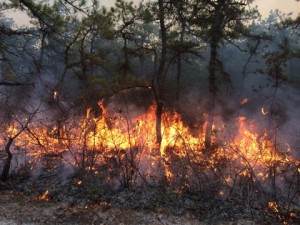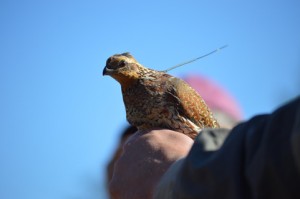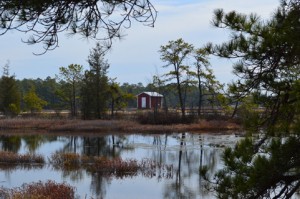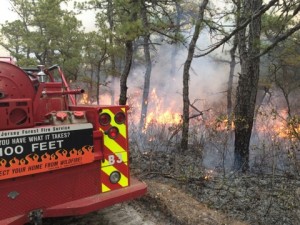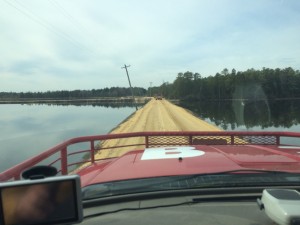Pine Island was the final stop on the tour for the 2021 North Atlantic Prescribed Fire Science Workshop. The goal for the workshop was “to reset, recharge, and reimagine the future of fire science co-production”, with a trip to Pine Island and other sites to “stimulate discussion about regional prescribed fire science challenges and solutions.”
Pine Island was chosen as a site for the Northern Bobwhite Restoration Initiative back in 2013. Over the course of four years (from 2014 to 2018), over 300 wild birds were captured on private land in Georgia, then transferred to our farm, where they were fitted with radio collars, released, and monitored, with the goal of establishing a self-sustaining population. Our site was chosen for several reasons, among them a state-approved Forest Stewardship Plan outlining long-term management goals as well as the extent of existing quality habitat already onsite from years of active forestry work, prescribed burning and agricultural best management practices that made it stand out above other sites in the region.
Why is prescribed burning so important?
Thirty miles east of Philadelphia, the New Jersey Pinelands National Reserve is one of the largest tracts of unbroken forest in the eastern United States. An urban escape, the 1.1-million-acre New Jersey Pine Barrens, as it’s known colloquially, features a mix of pitch pine, oak, and cedar forestland, and is home to roughly 850 plant and nearly 500 animal species—including dozens of rare and threatened species, such as the Pine Barrens tree frog and the swamp pink orchid. It’s also one of the most flammable landscapes in North America. In fact, scientists who study the physics and ecology of wildfire have long used the Pine Barrens as a laboratory. Those who study fire here are honing techniques for protecting residents in fire-prone ecosystems around the country. They’re also using fire as a tool to restore critical habitats and conserve threatened species in this fragile ecosystem. – AMC Outdoors, September 30, 2020.
Upon arrival, the group got to hear from John Parke of NJ Audubon about the details of the Northern Bobwhite Quail Initiative, as well as some background on the farm and property itself from Pine Island owner Bill Haines. After, the group was able to wander around the site for a little while to see what our fire practices have done for the landscape.
“For the recovery of Northern Bobwhite Quail it is important to understand that prescribed fire is a principal management tool used in habitat restoration for this species,” said John Parke, Stewardship Project Director of NJ Audubon. “NJ Audubon is very proud to have been asked by the North Atlantic Fire Science Exchange to be part of this workshop and showcase our Bobwhite Quail Translocation Project at the Pine Island Cranberry property. Also NJ Audubon would like to thank Pine Island Cranberry Company and the NJ Forest Fire Service for their amazing work to implement prescribed burning for the project and in the region, which not only helps create and maintain suitable habitat for Quail and other Pinelands species, but also helps to maintain proper Pinelands ecosystem functionality and protect the people and their property of the region by reducing fuel loads.”
Thank you to Amanda Mahaffey (Forest Stewards Guild) for putting the program together, and thank you to Albert Simeoni (WPI), Gabriel Cahalan (The Nature Conservancy), Geoffrey Lohmeyer (Ocean County Parks), Greg McLaughlin (NJ Forest Fire Service), J. Kevin Hiers (Tall Timbers), James Remuzzi (Sustainable Solutions, LLC), Jens Stevens (USDA Forest Service R&D Washington Office), Jeremy Webber (NJ Forest Fire Service), Jesse Kreye (Penn State University), Juan Cuevas (Worcester Polytechnic Institute), Ken Clark (USDA Forest Service), Kyle Derr (Sustainable Solutions LLC), Lauren Howard (Arcadia University), Maura Roisin O’Connor, Michael R. Gallagher (USDA Forest Service), Nick Skowronski (USDA Forest Service), Robert L Kremens (Rochester Institute of Technology), Robert Somes (NJ Division of Fish and Wildlife), Sam Adams (Sustainable Solutions LLC), Sheila Kappeler-Finn (Duende Consulting), Steve Holmes (US Fish and Wildlife/USAF Wildland Fire Program), Vinh Lang (Pine Creek Forestry), Virginia Schutte (NAFSE), William F Brash (NJ Fire Safety Council), and last but not least, longtime friend and neighbor Tom Gerber of Quoexin Cranberry Company for attending!

